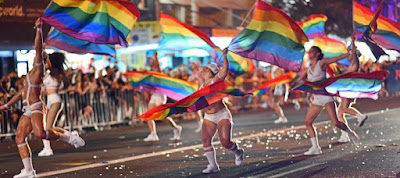Something To Be Proud Of: Inclusion is not without its downside. Once inside the fold, there is a strong temptation to silence dissenting voices. Calling out instances of ongoing discrimination and oppression smacks too much of biting the hand that no longer strikes you. Far better to welcome in all the institutions and businesses so eager, now, to be associated with the rainbow banner. The Pride Parade needs sponsors - not dissidents.
SHOULD WE BE SURPRISED that the rainbow community turned out
to be so conservative? That the effort of the Pride Parade board to address the
fear so easily triggered by police uniforms has provoked such a swift and devastating
backlash? That so many gay and lesbian people appear to have forgotten what it
feels like to be labelled, singled-out, trashed and excluded? That so many New
Zealanders seem unaware that it is precisely those who dwell furthest away from
the blessings of societal acceptance that have the strongest claim to our care
and protection?
Something has shifted. In the years separating the Hero
Parade from the Pride Parade the straight world’s perception of the rainbow
community and the rainbow community’s perception of itself have undergone
profound changes. What was once considered wild and transgressive has been made
safe. The civic leaders who railed against the Hero Parade’s raunchiness have
gone. Until this past fortnight, civic and corporate institutions have been
lining up to tell the world how proud they are of Pride.
It raises an important question. Was the “gay lifestyle”, as
mainstream New Zealand insisted on calling the non-normative expression of
human sexuality; or “queer culture”, as it often described itself; the product
of the dominant culture’s repression? Did the amelioration of that repression
lead to the well-behaved heterosexuality of the straight world becoming the
model for a rainbow community no longer obliged to make virtues out of the
vices it had for centuries been accused of embodying?
And was the straight world’s growing acceptance of the
rainbow community accelerated by the latter’s demand to be admitted to all of
society’s core institutions? Gays and lesbians insisted that they had as much
to offer the armed forces and the police as heterosexual citizens. Indeed,
there was no occupational grouping, no profession, which would not benefit from
opening its doors to the non-straight population. Likewise, the right to marry,
raise children, form families and bequeath property should be extended to all
citizens regardless of their sexual preferences. What was there to fear or
dislike about a community so determined to sign-up to all the world’s
conventions?
The watchword, for straights and non-straights alike, was
“inclusion”. The revolutionary rhetoric of the years immediately following the
Stonewall Riot in New York’s Greenwich Village had been vindicated. The years
of watching friends and lovers die of AIDS while the straight world looked on
and did nothing had, in the end, brought people of good will to the
understanding that pain and grief is universal. That, ultimately, our common
humanity trumps our diverse sexuality. It was something to celebrate. Something
to be proud of.
Hence the Pride Parade. Hence the sense of elation when
institutions like the Police and the Armed Forces signalled their willingness
to mouth the watchword. Now, at last, the horrors of the bad old days could be
forgotten. The hazing, the beatings, the murders. All the ritual humiliations,
perfected over centuries to punish those who failed the tests of church and
state. Why dwell upon the history when uniformed members of the rainbow
community were willing to march in step with the people their predecessors had
persecuted?
Inclusion is not without its downside, however. Once inside
the fold, there is a strong temptation to silence dissenting voices. Calling
out instances of ongoing discrimination and oppression smacks too much of
biting the hand that no longer strikes you. Far better to welcome in all the
institutions and businesses so eager, now, to be associated with the rainbow
banner – especially when you’re expected to cough-up $150,000 for the privilege
of walking down Ponsonby Road. The Pride Parade needs sponsors – not dissidents.
But does that need for the corporate dollar mean that the
issues raised by the trans community should simply be ignored? Should the fate
of young people locked up in police cells and prisons with, at best, only a
grudging acceptance of their gender identification or, at worst, uncaring
disregard, be set to one side? Is the treatment meted out to them while the
responsibility of Police and Corrections personnel unworthy of
consideration? Do their stories, laced as they are with all the trauma of
marginalisation and despair, not count?
The Pride Parade board decided that they did count and voted
narrowly to give the word “inclusion” a radical inflection. It was a brave
decision – and they are paying a very high price for it. Those who have
attempted to defend the board’s decision have been abused and spat upon
by angry supporters of the status quo. In terms of sheer numbers, it would
appear that the majority of the rainbow community favour a more conservative
definition of inclusion.
How quickly people forget.
This essay was
originally posted on The Daily Blog
of Friday, 23 November 2018.


